Dry skin relief from COVID-19 handwashing
Keep your skin hydrated
Applying a hand cream or ointment immediately after handwashing will keep your skin hydrated.
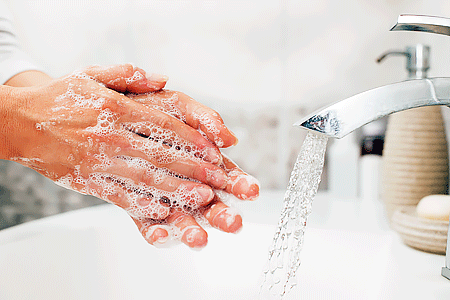
Has frequent handwashing left you with dry, cracked skin? With these tips from dermatologists you can continue to wash your hands as needed to fend off COVID-19 (coronavirus) and heal dry skin.
Here’s what dermatologists recommend:
Wash your hands for at least 20 seconds in lukewarm water. Use soap, and wash every part of your hands, including between your fingers and around your nails.
Dry hands? Continue to wash them.
Washing helps prevent illness by removing harmful bacteria and viruses.
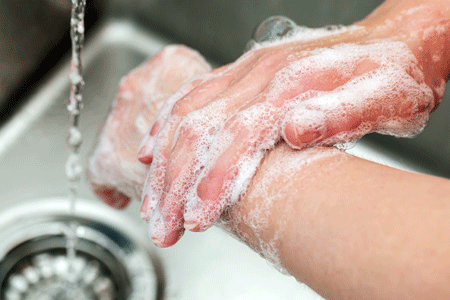
Dry your hands with a clean towel but leave some water on them. You can also let your hands air dry. While your hands are slightly damp, apply your hand cream or ointment.
Apply hand cream or ointment to your skin, making sure you work some of the moisturizer into your fingertips and nails. Dermatologists recommend using a hand cream or ointment that:
- Contains mineral oil or petrolatum
- Comes in a tube rather than a pump-bottle
- Says it’s “fragrance-free” and “dye-free”
Apply moisturizer
Dry, cracked skin makes it easier for bacteria and other germs to get inside your body. Applying moisturizer after handwashing helps heal dry skin.
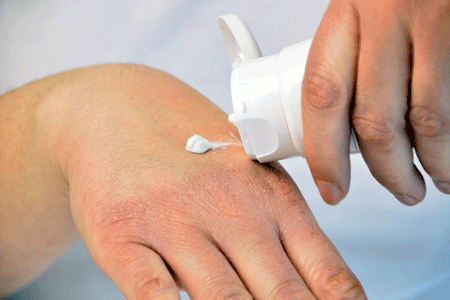
When you use hand sanitizer, apply your hand cream or ointment immediately after the hand sanitizer dries. Because the Centers for Disease Control (CDC) recommends using a hand sanitizer that contains at least 60% alcohol to kill germs, hand sanitizer can be very drying.
Using hand sanitizer
Allow hand sanitizer to dry. Then apply moisturizer.
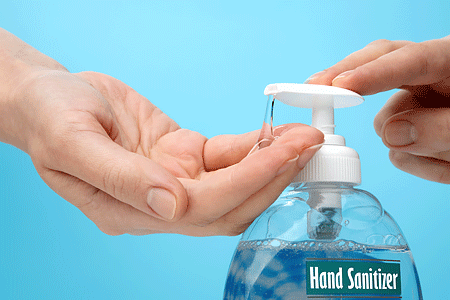
Get your health information from a trustworthy source. Going online to chat with friends and family can be comforting. When it comes to health information, it’s essential to get accurate and reliable information, such as from your doctor, websites reviewed by doctors such as this one, and the CDC.
What the science shows
You may have seen well-meaning posts on social media about keeping your hands clean. Some posts may come from assumptions rather than science. Here’s what the science shows:
There is no evidence that using a hand sanitizer makes it easier to pick up germs. It’s dry skin that increases your risk of picking up germs. If you have dry skin from using hand sanitizer, apply moisturizer immediately after your hand sanitizer dries.
Handwashing helps to prevent illness, but frequent handwashing can dry your skin. To prevent and heal dry skin, apply a hand cream or ointment after you wash your hands.
When skin is moist, it can better protect you from germs.
Video: Coronavirus - Is handwashing drying your skin?
Coronavirus: Is handwashing drying your skin?
Washing your hands is critical to slow the spread of the coronavirus (COVID-19). However, frequent handwashing can cause dry skin that can flake, itch, crack, and even bleed without proper precautions. This can cause open wounds in your skin that can allow in bacteria and other germs and increase your risk for infection.
To reduce your risk of dry, cracked skin from handwashing, follow these tips from board-certified dermatologists.
Infographic: Coronavirus - Is handwashing drying your skin?
This infographic provides tips to help keep your skin healthy and hydrated during frequent COVID-19 handwashing. Click the image below to download a PDF of the infographic.
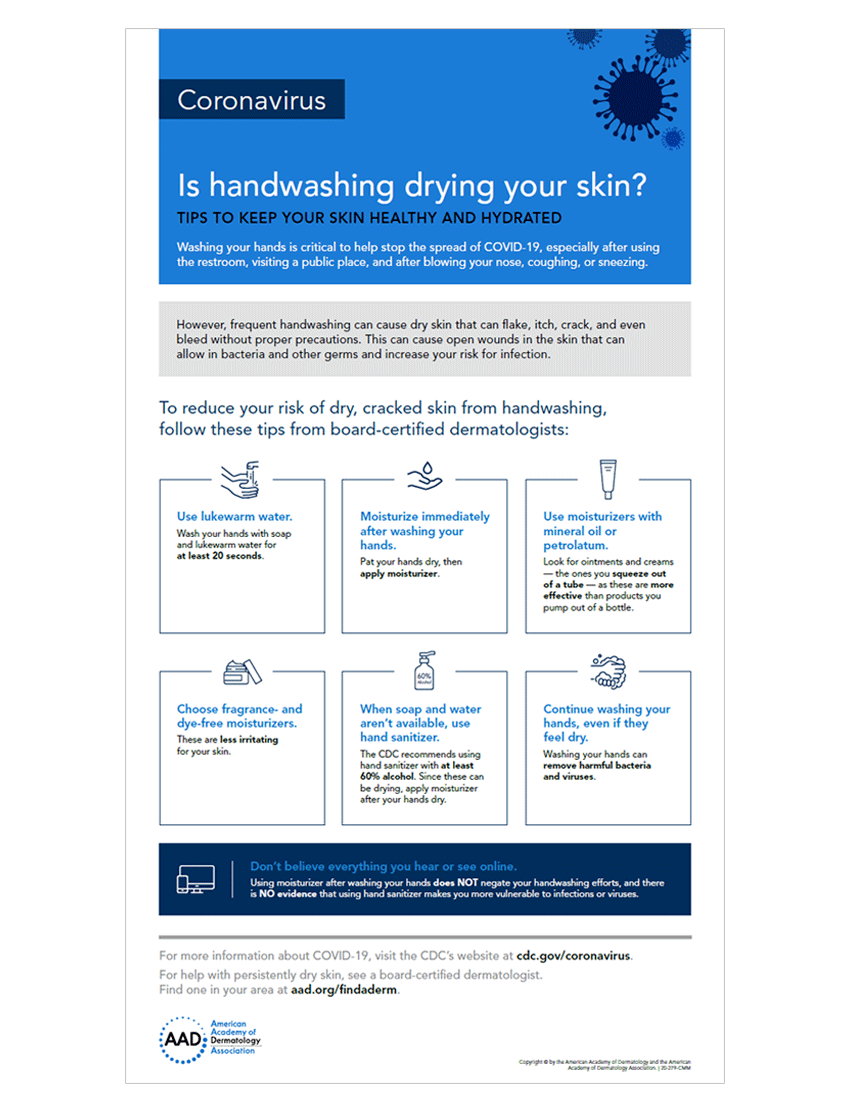
Need more information?
Have questions about how to wash your hands? Want to know when to use hand sanitizer? You can get accurate information from:
When to contact a dermatologist
If you still have dry skin after following these tips, you may need a dermatologist’s help. To heal dry skin, some people need a prescription cream or ointment. If you have a skin condition that causes extremely dry skin, such as atopic dermatitis, you need to treat the skin condition to relieve dry skin. A dermatologist can diagnose you. A dermatologist can provide the treatment you need.
Related AAD resources
All content solely developed by the American Academy of Dermatology
Supported by:
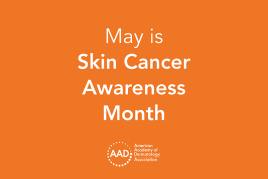 Think sun protection during Skin Cancer Awareness Month
Think sun protection during Skin Cancer Awareness Month
 How to care for your skin if you have lupus
How to care for your skin if you have lupus
 Practice Safe Sun
Practice Safe Sun
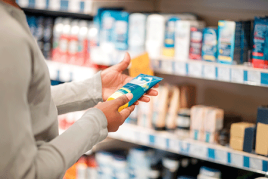 Sunscreen FAQs
Sunscreen FAQs
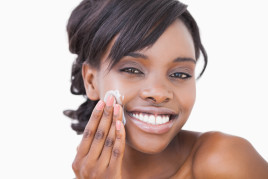 Fade dark spots
Fade dark spots
 Hidradenitis suppurativa
Hidradenitis suppurativa
 Laser hair removal
Laser hair removal
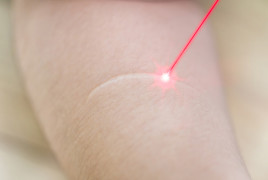 Scar treatment
Scar treatment
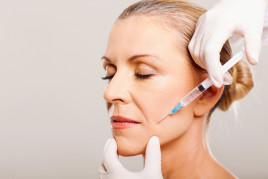 Botox
Botox
 Kids' camp - Camp Discovery
Kids' camp - Camp Discovery
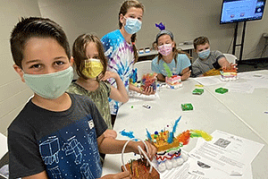 Dermatologist-approved lesson plans, activities you can use
Dermatologist-approved lesson plans, activities you can use
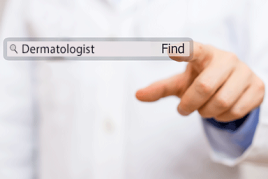 Find a Dermatologist
Find a Dermatologist
 Why choose a board-certified dermatologist?
Why choose a board-certified dermatologist?
